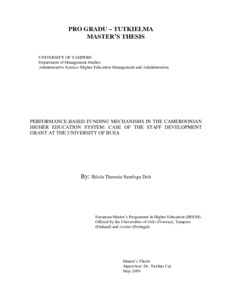PERFORMANCE-BASED FUNDING MECHANISMS IN THE CAMEROONIAN HIGHER EDUCATION SYSTEM: CASE OF THE STAFF DEVELOPMENT GRANT AT THE UNIVERSITY OF BUEA
SAMFOGA-DOH, BILOLA (2009)
SAMFOGA-DOH, BILOLA
2009
Hallintotiede - Administrative Science
Kauppa- ja hallintotieteiden tiedekunta - Faculty of Economics and Administration
This publication is copyrighted. You may download, display and print it for Your own personal use. Commercial use is prohibited.
Hyväksymispäivämäärä
2009-06-18
Julkaisun pysyvä osoite on
https://urn.fi/urn:nbn:fi:uta-1-19952
https://urn.fi/urn:nbn:fi:uta-1-19952
Tiivistelmä
Observing that most developed countries are increasingly shifting towards some form of performance-based funding (PBF) of higher education, this study sought to identify and examine how similar funding mechanisms were being implemented in Cameroon. In an overview of the higher education landscape in Cameroon, a funding scheme called Staff Development Grant (SDG) was identified at the University of Buea which seemed to possess most of the features of PBF. A qualitative research approach was used with the SDG as the case study. The related policy documents and empirical data were analysed to examine the degree to which the SDG conformed to performance-based funding and how its objectives were met. A semi-structured questionnaire was administered to the staff of that university, then the contents of the policy documents and responses from the questionnaire were analysed qualitatively.
The results of the study reveal that the SDG had several features which qualified it to be classified as a performance-based funding scheme and that it was a valuable instrument in enhancing the responsiveness and productivity of the academic staff. Besides objectives like an increased volume of publications, indication of minimal research productivity and promotion which were met, the data reveal that the SDG spurred a culture of creativity, innovativeness and team spirit in the academic corps of the university. The study conveys the message for the possibilities of similar schemes to be explored with other objectives of the higher education system or institutions in Cameroon. Such performance-based funding schemes would likely enhance other institutional or system’s objectives and thereby contribute to improve the quality, efficiency and responsiveness of the institutions. Future researchers, consultants, managers and policy-makers in Cameroon and hopefully other countries in similar developing national contexts could explore the extent to which such performance schemes could be designed to facilitate or drive other objectives or expectations from higher education.
Asiasanat:
Performance, Funding, Indicators, Staff Development
The results of the study reveal that the SDG had several features which qualified it to be classified as a performance-based funding scheme and that it was a valuable instrument in enhancing the responsiveness and productivity of the academic staff. Besides objectives like an increased volume of publications, indication of minimal research productivity and promotion which were met, the data reveal that the SDG spurred a culture of creativity, innovativeness and team spirit in the academic corps of the university. The study conveys the message for the possibilities of similar schemes to be explored with other objectives of the higher education system or institutions in Cameroon. Such performance-based funding schemes would likely enhance other institutional or system’s objectives and thereby contribute to improve the quality, efficiency and responsiveness of the institutions. Future researchers, consultants, managers and policy-makers in Cameroon and hopefully other countries in similar developing national contexts could explore the extent to which such performance schemes could be designed to facilitate or drive other objectives or expectations from higher education.
Asiasanat:
Performance, Funding, Indicators, Staff Development
